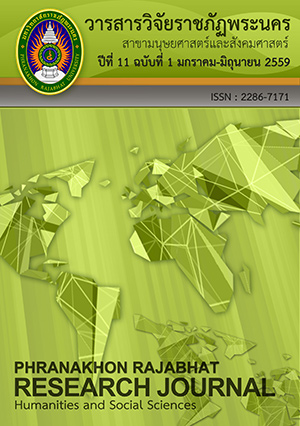การจัดการความรู้ภูมิปัญญาท้องถิ่นสู่การท่องเที่ยวเชิงนิเวศน์วัฒนธรรม กรณีศึกษาตำบลเกาะเกิด อำเภอบางปะอิน จังหวัดพระนครศรีอยุธยา
Main Article Content
Abstract
THE KNOWLEDGE MANAGEMENT FOR ECOLOGICAL
AND CULTURAL TOURISM DEVELOPMENT IN KOKOET, SUB-DISTRICT,
BANGPA-IN DISTRICT, PHRANAKHON SI AYUTTHAYA PROVINCE
การวิจัยนี้มีวัตถุประสงค์เพื่อ 1) ศึกษาองค์ความรู้และรวบรวมองค์ความรู้ของตำบลเกาะเกิด
และ 2) เพื่อศึกษาสภาพการมีส่วนร่วมปัญหาและอุปสรรคของการจัดการความรู้ของตำบลเกาะเกิด
ผู้ให้ข้อมูลสำคัญ คือ ผู้เชี่ยวชาญด้านองค์ความรู้ภูมิปัญญาท้องถิ่นแต่ละประเภทของตำบลเกาะเกิด
ที่ชุมชนให้ การยอมรับ จำนวน 15 คน เครื่องมือที่ใช้ในการวิจัยได้แก่ แบบสัมภาษณ์แบบปลายเปิด และ
การสัมภาษณ์ เชิงลึก การวิเคราะห์ข้อมูลข้อมูลที่ได้จากการสัมภาษณ์ ผู้วิจัยได้นำข้อมูลไปวิเคราะห์ผล
สรุปประเด็นหลัก ประเด็นรอง พร้อมทั้งตรวจสอบข้อมูลโดยผู้เชี่ยวชาญของท้องถิ่น และนำมาสรุปเรียบ
เรียงตามประเด็นต่าง ๆ เพื่อนำเสนอโดยการพรรณนา
ผลการวิจัยพบว่าองค์ความรู้ภูมิปัญญาท้องถิ่นของตำบลเกาะเกิดอำเภอบางปะอิน จังหวัด
พระนครศรีอยุธยา มีจำนวนทั้งสิ้น 15 องค์ความรู้ ได้แก่ 1) องค์ความรู้เกี่ยวกับเรื่องของถั่วดาวอินคา
2) องค์ความรู้เรื่องการเลี้ยงปลาธรรมชาติ และการปลูกพืชแบบผสมผสาน 3) องค์ความรู้เรื่องผักอินทรีย์
4) องค์ความรู้เรื่องขนมกง 5) องค์ความรู้เรื่องขนมต้ม 6) องค์ความรู้เรื่องข้าวต้มมัด 7) องค์ความรู้เรื่อง
การทำหมี่กรอบแบบโบราณ 8) องค์ความรู้เรื่องขนมหม้อแกงโบราณ 9) องค์ความรู้เรื่องน้ำนมข้าวยาคู
10) องค์ความรู้เรื่องขนมสามเกลอ 11) องค์ความรู้เรื่องขนมข้าวยาคู 12) องค์ความรู้เรื่อง การเพาะเห็ด
ยานางิ 13) องค์ความรู้เรื่องไม้ยืนสุขภาพ 14) องค์ความรู้เรื่องเกษตรอินทรีย์ และ 15) องค์ความรู้เรื่อง
สมุนไพรไล่แมลง
สภาพการมีส่วนร่วมในการจัดการความรู้ของชุมชนพบว่ามีส่วนร่วมในเรื่องต่อไปนี้ 1) การกำหนด
องค์ความรู้ 2) การรวบรวมองค์ความรู้ 3) การตรวจสอบองค์ความรู้ และ 4) การเผยแพร่องค์ความรู้
ส่วนปัญหาอุปสรรคในการจัดการความรู้ของตำบลเกาะเกิด อำเภอบางปะอิน จังหวัดพระนครศรีอยุธยา
คือ 1) ขาดแหล่งรวบรวมองค์ความรู้หรือศูนย์การเรียนรู้ 2) การกระจายองค์ความรู้ยังไม่มีช่องทาง
การเผยแพร่องค์ความรู้ที่เหมาะสม หรือมีรูปแบบที่ชัดเจน 3) ยังไม่ได้รับการสนับสนุนจากหน่วยงาน
จากภายนอกเข้าไปช่วยเหลือ หรือนำองค์ความรู้มาพัฒนาอย่างจริงจัง 4) หน่วยงานภาครัฐ โดยเฉพาะ
องค์กรระดับท้องถิ่นยังไม่มีส่วนร่วมในการจัดการองค์ความรู้ 5) การถ่ายทอดองค์ความรู้ยังขึ้นอยู่กับ
ความสนใจเป็นรายบุคคลและการถ่ายทอดผ่านครัวเรือนยังไม่มีการจัดอบรมองค์ความรู้ให้กับลูกหลาน
หรือผู้ที่สนใจทั่วไป 6) ชุมชนยังขาดการจัดประชุมร่วมกันอย่างเป็นระบบ เพื่อกำหนดทิศทางของกลุ่ม และ
7) ขาดการบริหารจัดการในรูปแบบองค์กรเพื่อแบ่งหน้าที่กันทำการบริหารยังกระจุกตัวอยู่ที่คนบางกลุ่ม
The objectives of this qualitative research were: 1) to explore the local knowledge
existed in the area of Tambon Kokoet, Bangpa-in District, Phranakhon Si Ayutthaya
Province, and 2) to identify the state of problems and obstacles in Knowledge Management
in Tambon Kokoet.The key informants were included 15 specialists in the studied area.
The tools used in this research were the set of open-ended questions and the in-depth
interview. The data gathered from the informants had been initially analyzed and
categorized. The results then had been respectively listed and reliably crosschecked by
the local specialists before descriptively presented.
According to the research result, it was founded that there were 15 local intellectual
assets existed in the area including: 1) Knowledge in growing and processing Sacha Inchi
(Plukenetia volubilis, 2) Knowledge in ecological fsh farming and blended agriculture,
3) Knowledge in cultivating organic vegetables, 4) Knowledge in making Kanom Gong,
5)Knowledge in making Kanom Tom, 6) Knowledge in making Khaotommat, 7) Knowledge
in making the old style of Meekrob, 8) Knowledge in making the old style of Kanom
Mo-Kaeng, 9) Knowledge in extracting milk from immature ricegrains, 10) Knowledge in
making Kanom Samkloe, 11) Knowledge in makingsweetfromthe immature rice grains,
12) Knowledge in culturing Yanagimatsutake mushroom, 13) Knowledge in manufacturing
Health Stand Boards, 14) Knowledge in organic agriculture, and 15) Knowledge in producing
herbal pesticide.
In addition, the research results showed that the participative roles of the
community members in Tambon Kokoet in their local knowledge management included
identifying, gathering, checking and publicizing their local intellectual assets.
Regarding to the problems and obstacles, there were founded: 1) the knowledge
learning center in the community needs to be established. 2) there wasunappropriate
and valid knowledge publication channel. 3) there was no support from outside sources.
4) the government organizations, especially the ones at local level, had insuffciently
played the supportive role in knowledge management. 5) the knowledge enhancement
and instructional process were individually limited. 6) the prompted conventional
integration was needed to strengthen the community integrity and cooperation. And,
7) the administration was centralized.
Article Details
Each publish articles were copyright by Phranakorn Rajabhat University
Any contents which appeared in each articles in the journal were authors personal opinion. It did not relate to Phranakorn Rajabhat University and other instructors in the university. Each authors would take responsibility on their articles. If there are any mistake, the authors will take responsibility themselves


